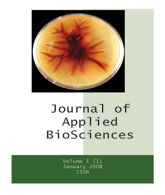Journal of Applied Biosciences (J. Appl. Biosci.) [ISSN 1997 - 5902]
Volume 49: 3394 - 3405. Published January 29, 2012.
Perception of farmers’ management strategies for termites control in Ghana
Akutse K. S 1, 2*, Owusu E. O. 1 and Afreh-Nuamah K. 1
1African Regional Postgraduate Programme in Insect Science (ARPPIS), University of Ghana, P O. Box: PMB, L. 59 Legon-Accra, Ghana; 2 International Centre of Insect Physiology and Ecology (ICIPE), P. O. Box 30772-00100, Nairobi, Kenya.
ABSTRACT
Objective: Termites are serious pests in West Africa affecting crop production, buildings, books and wood conservation. Intensive use of insecticides which is of great environmental and health concerns was the most frequently control option. To make termites management environmentally friendly, there is a need to integrate indigenous knowledge about pest management techniques into the scaling-up process in order to improve farmers’ pest management practices. This paper documents farmers’ knowledge, perceptions and management practices against termites in Greater Accra and Volta Regions of Ghana.
Methodology and results: Traditional methods of controlling termites used by farmers, obtained from a survey include application of plant extracts (55.71% of the respondents), dead animals, toads and intestines of rat (42.86%), physical removal of the queen (64.29%), human urine (55.71%), wood ash (30%), and poultry (60%). These are mainly practiced by small-scale farmers and their efficiency needs to be studied, improved and promoted. Additionally, a total of thirteen plants traditionally used for termite control were identified from the survey. From the 70 farmers investigated, 44.29% depend on chemicals and other strategies, while 55.71% used plants as control strategy. About 67.67% combined plants with chemicals and other strategies.
Conclusion and application: Indigenous termite’s taxonomic knowledge identified needs to be documented and promoted to facilitate communication between farmers, extension agents and scientists on specific pest problems. The efficiency of the various indigenous control practices reported by farmers in this study need to be verified, and the promising ones standardized and promoted with other IPM measures with the aim of reducing chemical pesticides application.
Key words: Termites, Macrotermes sp., Control strategies, Indigenous knowledge.
FULL PAPER [PDF AVAILABLE HERE]
